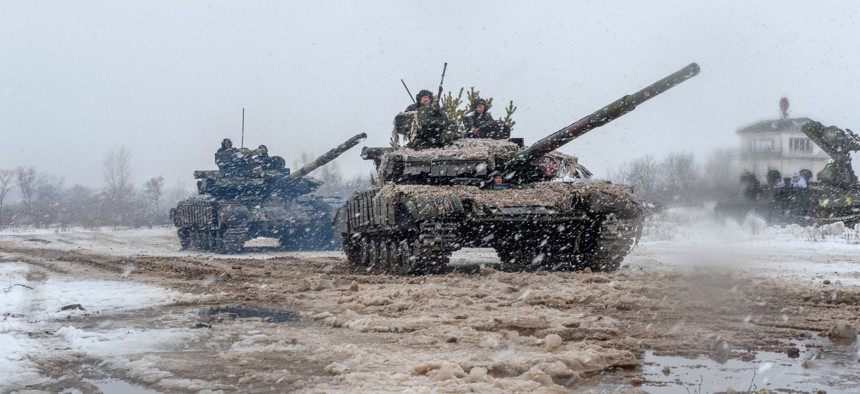
Ukrainian troops of the 92nd Mechanised Brigade use tanks, self-propelled guns, and other armoured vehicles in live-fire exercises near the town of Chuguev, Kharkiv, on Feb 10, 2022. Photo by SERGEY BOBOK/AFP via Getty Images
The U.S. Orders Most Troops and Diplomats to Leave Ukraine
More than 150 National Guardsmen were pulled from the Ukraine and only a skeleton crew remains in Kyiv after a phone call between President Biden and Russian President Vladimir Putin produces “no fundamental change."
U.S. officials on Saturday ordered most American military and diplomatic personnel to leave Ukraine amid concerns that a Russian invasion could happen this week. A morning phone call between President Joe Biden and Russian leader Vladimir Putin produced “no fundamental change" in the situation, a senior administration official told reporters.
The exodus of American and international personnel comes after Biden’s national security advisor, Jake Sullivan, warned on Friday that Russia could launch a military strike “at any time” now that it has an estimated 130,000 troops surrounding Ukraine.
Over the past few months, Biden administration officials have repeatedly said they would not deploy Americans to Ukraine to face Russian troops or otherwise defend Ukraine on the ground. On Saturday, U.S. Defense Secretary Lloyd Austin ordered the last contingent of American soldiers training Ukrainian troops to leave the country. The 160 soldiers from the 53rd Infantry Brigade Combat Team of the Florida National Guard have been serving in Joint Multinational Training Group-Ukraine since November. They will be temporarily moved elsewhere in Europe.
“The secretary made this decision out of an abundance of caution — with the safety and security of our personnel foremost in mind — and informed by the State Department’s guidance on U.S. personnel in Ukraine,” Pentagon spokesman John Kirby said in a statement on Saturday. “This repositioning does not signify a change in our determination to support Ukraine's Armed Forces, but will provide flexibility in assuring allies and deterring aggression.”
The U.S. embassy in Kyiv on Saturday directed most personnel to leave the country “immediately,” a State Department official told reporters. The embassy will suspend routine consular services for passports and visas on Sunday, the official said, making it even more critical for Americans to leave the country now.
“It is past time for private citizens to leave Ukraine,” the official said. “There are real limits to what we are able to do in a war zone.”
Biden spoke with Putin on Saturday morning, as part of a flurry of diplomatic phone calls in which Washington urged Moscow to stand down. While the hour-long call was “professional and substantive,” there was “no fundamental change in the dynamic that’s been unfolding now for several weeks” and there is no evidence that Russia is interested in de-escalation, the senior administration official said.
“We remain committed to keeping the prospect of de-escalation and diplomacy alive, but we are also clear-eyed about the prospect” of military action, the official said. “The stakes of this are too high not to give Russia every chance to avoid action that we believe would be catastrophic.”
As well, Austin spoke with his counterpart, Russian Defense Minister Sergey Shoygu, according to a brief Pentagon statement: “They discussed Russia’s force build-up in Crimea and around Ukraine.”
Secretary of State Antony Blinken also spoke with his counterpart, Sergey Lavrov, to “discuss acute and shared concerns” about the potential for an attack on Ukraine “in the coming days.”
“The secretary made clear that a diplomatic path to resolving the crisis remained open, but it would require Moscow to deescalate and engage in good-faith discussions,” according to a State Department statement. “He reiterated that should Moscow pursue the path of aggression and further invade Ukraine, it would result in a resolute, massive, and united Transatlantic response.”
A small group of American diplomatic personnel will move to Lviv, a Ukrainian city near the Poland border, to continue to provide emergency services, while a “bare minimum” of staff will remain in Kyiv to facilitate communication with Washington, the official said.
“We are not closing the embassy. We are not suspending operations,” the official said. “We are further reducing at this time the number of staff that we have in country to conduct only the most essential business at this time.”
Most of the departing personnel will return to Washington to continue to work on the crisis in Ukraine from afar, the official said.
Biden officials have kept in close contact with allies worldwide to discuss the Ukraine situation. Blinken spoke with New Zealand Foreign Minister Nanaia Mahuta about Ukraine, as well as the administration’s new Indo-Pacific strategy, according to a State Department statement. On Friday, Sullivan met with Sweden’s Karin Wallensteen, state secretary for foreign affairs to the prime minister, and spoke with top EU officials, the White House said.
Germany closed its consulate in eastern Ukraine on Saturday, and announced it would reduce the number of diplomatic staff in Kyiv, BNO News reported. On Friday night, Israel announced it would evacuate the families of diplomats from Ukraine, Reuters reported.
The American military is seeking to reassure NATO allies as the threat of a Russian invasion grows. On Friday, Austin ordered 3,000 additional soldiers from the 82nd Airborne Division to deploy to Poland and deter Russian aggression against the alliance’s eastern flank. Earlier this month, he ordered 1,700 soldiers from the division to head to Poland and 300 soldiers from the XVIII Airborne Corps to Germany.






